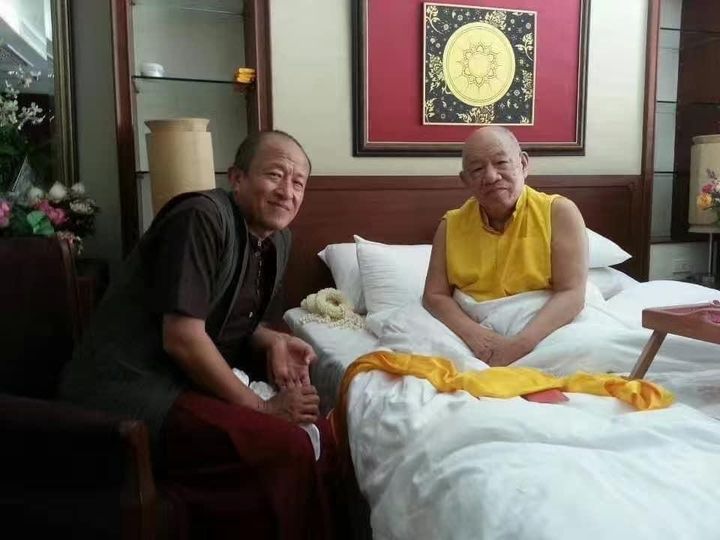
We human beings tend to assess the authenticity or value of a politician, humanitarian activist or environmentalist by how well they put a theory into practice. But such an assessment is not easy to make. Does the person practise what they preach? Do they walk the talk? It’s hard to tell. And it gets even more difficult when the person involved has something to do with a spiritual path.
Many of us are very good at presenting buddhist teachings. When we teach impermanence, for instance, we have the ability to quote the best advice from the great commentaries and recite from memory the Buddha’s words and songs of impermanence. Yet the moment we are called on to forgive and forget, our hearts freeze solid. And the moment a grand vision requires some long-term planning, all thought of impermanence is crushed.
Some of us may have the ability to talk convincingly about bodhichitta. But when push comes to shove, our practice of bodhichitta is, at best, to accumulate merit so we can advance along our own spiritual path or, at worst, for our own personal gratification. And if you think the practice of bodhichitta is challenging, wait until you hear about Dzogchen and what it takes to put those teachings into action.
One of the core Dzogchen teachings is about being uncontrived and carefree. In other words, how to be 100% genuine and authentic in manner, attitude, world view and so on. Many people these days love to talk about the great path of ‘uncontriving’, but few are able to practise and actually live it – to be a Dzogchenpa. No wonder the great Dzogchen masters have warned us again and again about the vast chasm between Dzogchen the teaching and the Dzogchenpa.
Kyabje Dodrupchen Rinpoche was considered by many devotees, and especially by his disciples, to be one of the 20th century’s rare, living vidyadharas; a carefree ‘awareness holder’, who, to plagiarize Trungpa Rinpoche, was the epitome of ‘authentic presence’. Personally, I would not dare to make such a claim. How could I? Only vidyadharas can recognize other vidyadharas.
Even so, there are other ways for someone like me to establish whether a person is a vidyadhara or not. One way is to listen to my masters. Many great masters, my own included, openly venerated Kyabje Dodrupchen Rinpoche as a vidyadhara. In my experience, every word these masters ever spoke turned out to be true, so there was no reason for me not to believe them. Another way is through personal observation.
I should mention here that, although I pretend otherwise, I am a sucker when it comes to meeting social expectations, norms, etiquettes and, of course, political correctness, all of which I love to play with – which in itself is a sign of my lack of authenticity. Full, as I am, of insecurities, every move I make spawns more and more hypocrisy. Perhaps that is why the world my projections create seems to be full of hypocrites – hypocrites who ooze humility yet are anything but humble, who strive to be outrageous but whose basic attitudes are deeply conventional, who exude austerity in public but privately indulge in wanton extravagance.
Many of us adopt and even try to flaunt an easy-going, carefree persona but it’s rarely more than skin deep. Few people in this world are genuinely carefree. One of the side effects of this lack of carefreeness is that our every thought and action is contrived or fabricated. As a result, view, meditation and action become sanctimonious and hypocritical: the view is veiled by exaggeration or under-estimation (we exaggerate the ultimate truth and underestimate the relative truth); meditation is make-believe; and our actions breed a continuous stream of judgements about ourselves and others. Year after year, we talk about emptiness, yet the tiniest criticism cuts us to the quick and at a hint of praise we visibly bloat with pride.
I have known Kyabje Dodrupchen Rinpoche since I was nine years old. Time and again, in spite of my own narrow, limited perceptions, I witnessed just how uncompromising he always was – one of the few truly uncompromising beings on this planet. But were I to recount some of the incidents that demonstrate just how uncompromising and unhypocritical he really was, there would be an uproar. It might even trigger negative activities which could lead to the ruin of oneself and others. Like the frog who thought the tiny well he lived in contained all the water in the world, then fainted with shock when he saw a pond and realized how small his vision had been, many people would not believe a word, while others would faint with shock. Just a few would appreciate that everything Kyabje Dodrupchen Rinpoche ever did was an astonishing demonstration of authenticity.
Those who can savour the taste of the uncontrived path, not just in theory but in practice, will appreciate just how blessed the beings of this age are to have been alive at the same time that Kyabje Dodrupchen Rinpoche walked on this earth, a living embodiment of the Buddha’s Dharma.
– Dzongsar Jamyang Khyentse